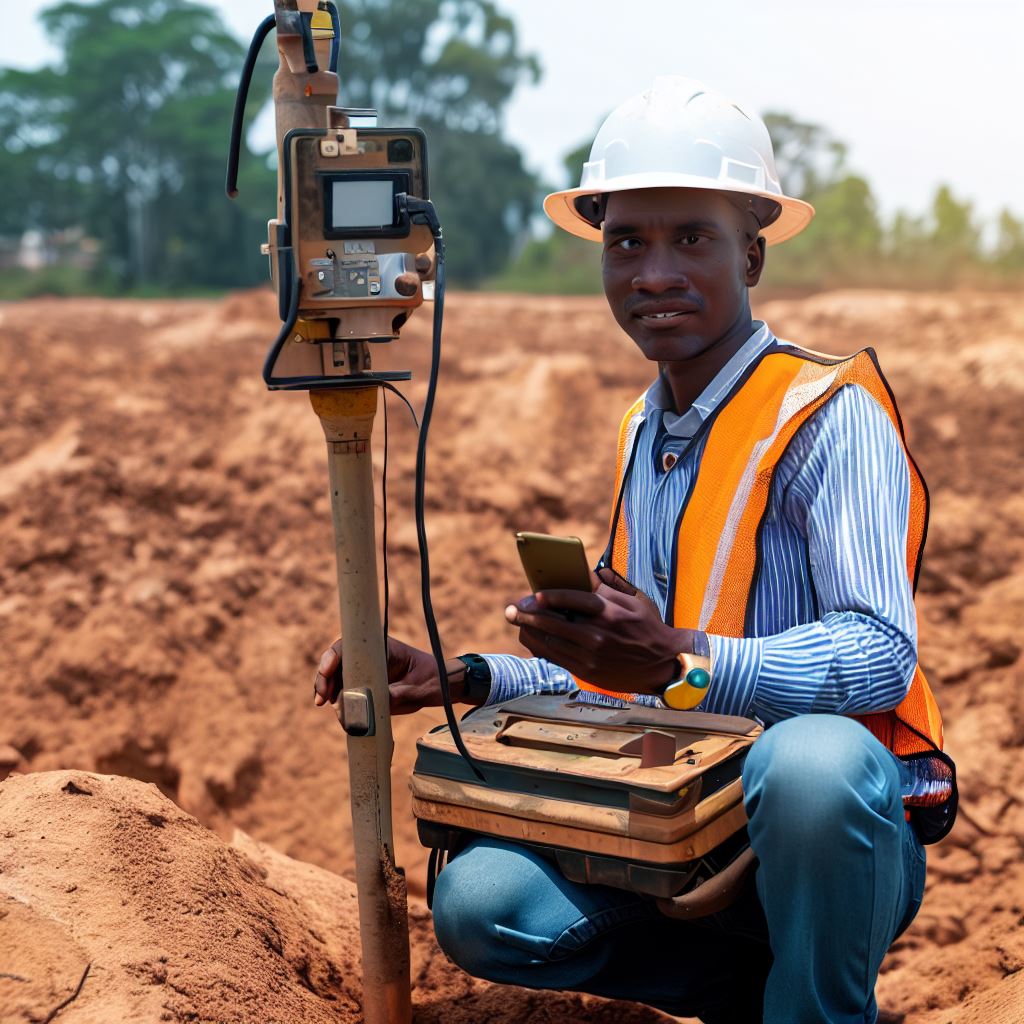Introduction
Biostatistics is the application of statistical methods to biological and health-related data.
Biostatisticians play a crucial role in Nigeria by analyzing and interpreting health data.
They provide valuable insights to policymakers and help in evidence-based decision making.
Without biostatisticians, it would be difficult to accurately assess public health challenges in Nigeria.
Biostatistics is the branch of statistics that deals with the design and analysis of biological and health-related studies.
It involves the collection, organization, and interpretation of data to make informed decisions.
Biostatisticians use statistical tools and techniques to draw conclusions from data and provide insights.
Biostatisticians in Nigeria play a critical role in healthcare research and policy development.
They contribute to understanding disease patterns, identifying risk factors, and evaluating interventions.
Their expertise helps in addressing public health challenges and improving the overall health outcomes of Nigerians.
Effective collaboration between biostatisticians and other healthcare professionals is essential to achieve these goals.
In fact, biostatisticians in Nigeria are instrumental in analyzing health data and providing evidence-based recommendations for public health policies.
Their expertise is vital for understanding and addressing the challenges facing the healthcare system in Nigeria.
Collaboration between biostatisticians and other stakeholders is essential for improving health outcomes and achieving sustainable development in Nigeria.
Lack of Adequate Training and Education
Insufficient number of academic programs in biostatistics
- Limited options for pursuing a degree specifically in biostatistics.
- Lack of universities offering specialized courses in this field.
- Limited choices pose a challenge for individuals interested in pursuing biostatistics.
Limited access to quality training and educational resources
- Inadequate availability of up-to-date textbooks and reference materials.
- Limited access to online courses or webinars for professional development.
- Biostatisticians struggle to stay updated with new techniques and advancements.
Inadequate practical experience opportunities
- Limited availability of internships or hands-on training programs in biostatistics.
- Lack of exposure to real-life research projects and data analysis scenarios.
- Biostatisticians face difficulty in translating theoretical knowledge into practical skills.
Overall, the lack of adequate training and education in biostatistics poses significant challenges for professionals in Nigeria.
The limited number of academic programs makes it challenging for individuals to acquire specialized education in this field.
Additionally, the limited access to quality training and educational resources hampers the ability to stay updated with evolving techniques and advancements.
Moreover, the shortage of practical experience opportunities deprives biostatisticians of the chance to apply their theoretical knowledge in real-life scenarios.
Read: How to Start a Biostatistician Career in Nigeria
Limited Funding for Research and Projects
Lack of government support and budget allocation for biostatistics
The field of biostatistics in Nigeria faces numerous challenges, with limited funding being one of the most significant ones.
The government’s lack of support and inadequate budget allocation for biostatistics pose major obstacles to the progress and development of the field.
Biostatisticians play a crucial role in public health research, providing data analysis and statistical expertise to guide healthcare policies and interventions.
However, without adequate financial backing and resources, their ability to carry out their work effectively is greatly hindered.
The government’s failure to prioritize biostatistics in Nigeria reflects a gap in understanding the importance of statistical analysis in driving evidence-based decision-making.
Lack of financial support hampers biostatisticians’ access to essential tools and software, impairing data analysis accuracy and research reliability.
Inadequate funding for research studies and data collection
Insufficient funding for research studies and data collection is another critical challenge faced by biostatisticians in Nigeria.
Conducting high-quality research requires substantial financial resources to cover various expenses, including data collection, laboratory costs, and research equipment.
Limited research funds force biostatisticians into compromising situations, jeopardizing study validity and findings’ generalizability.
Limited funding leads to smaller sample sizes, increasing the risk of bias and reducing statistical power.
Moreover, inadequate funding restricts the scope of research projects, affecting their impact and potential contribution to public health.
Biostatisticians often deal with complex datasets that necessitate advanced statistical methods and computational tools.
However, without sufficient funds to access these resources, they are unable to conduct in-depth analyses and generate robust conclusions.
Impact on the capability of biostatisticians to conduct comprehensive analysis and provide accurate results
The limited funding available for research and projects significantly hampers the ability of biostatisticians to carry out comprehensive analyses and provide accurate results.
- Inadequate resources and financial support undermine the quality and reliability of their work.
- Biostatisticians rely on sophisticated statistical techniques and software to analyze complex health data sets effectively.
- The lack of funding inhibits their access to such tools and compromises the integrity of their analysis.
- This limitation not only affects individual research projects but also impedes the advancement of the entire field of biostatistics in Nigeria.
- Accurate and reliable statistical analysis is crucial for evidence-based decision-making in healthcare.
- The limitations arising from limited funding compromise the credibility of research findings and hinder the translation of research into real-world policies and interventions.
- As a result, public health initiatives may be based on less robust evidence, potentially leading to ineffective or harmful interventions.
In short, the challenges posed by limited funding for research and projects are substantial for biostatisticians in Nigeria.
The lack of government support, inadequate budget allocation, and inadequate funding for data collection all contribute to the difficulties faced by these professionals.
To overcome these challenges and advance biostatistics, increased financial investment, and recognition of statistical analysis’s importance in healthcare decisions are crucial.
Read: Nigeria’s Biostatistician Job Market: An Analysis
Poor Data Collection and Management Practices
Inadequate data collection infrastructure and systems
Biostatisticians in Nigeria face numerous challenges when it comes to data collection and management.
One major issue is the inadequate infrastructure and systems in place for data collection.
Without proper tools and resources, it becomes difficult for biostatisticians to effectively collect and manage data.
Unfortunately, many health facilities in Nigeria lack the necessary technology and equipment to collect data efficiently.
This includes things like electronic data capture systems, which are essential for streamlining data collection and minimizing errors.
Limited availability of reliable and comprehensive health data
Another challenge faced by biostatisticians in Nigeria is the limited availability of reliable and comprehensive health data.
Access to high-quality data is crucial for conducting accurate statistical analysis and making informed decisions.
However, there is often a lack of comprehensive health data in Nigeria.
This is due to various reasons such as poor record-keeping practices, limited data sharing between institutions, and a lack of funding for data collection initiatives.
Challenges in storing, analyzing, and interpreting complex datasets
Biostatisticians in Nigeria also encounter challenges when it comes to storing, analyzing, and interpreting complex datasets.
- With advancements in technology, data sets are becoming larger and more complex, requiring sophisticated analytical techniques.
- However, inadequate training and resources make it difficult for biostatisticians to effectively handle and analyze these datasets.
- The lack of access to modern statistical software and limited computational infrastructure further exacerbates the problem.
- Interpreting complex datasets, especially in multivariate analysis and intricate statistical models, can be challenging.
- Biostatisticians need to have a deep understanding of these methods to draw accurate conclusions from the data.
The challenges facing biostatisticians in Nigeria regarding data collection and management are multifaceted.
Inadequate infrastructure and systems hinder the efficient collection of data, limiting the availability of reliable and comprehensive health data.
Biostatisticians also struggle with storing, analyzing, and interpreting complex datasets due to inadequate training and resources.
To address these challenges, it is crucial for the Nigerian government to invest in improving data collection infrastructure and systems.
This includes providing health facilities with the necessary technology and equipment for efficient data collection.
Additionally, efforts should be made to enhance record-keeping practices and data sharing between institutions.
Moreover, training programs and initiatives should be implemented to enhance the skills and knowledge of biostatisticians in Nigeria.
Access to modern statistical software and computational infrastructure should also be prioritized.
By addressing these challenges, biostatisticians will be better equipped to contribute to evidence-based decision making and improve health outcomes in Nigeria.

Insufficient Collaboration and Networking Opportunities
Collaboration and networking play a crucial role in the growth and development of any profession, including biostatistics.
However, biostatisticians in Nigeria face various challenges when it comes to collaborating with their peers and accessing networking opportunities.
Lack of communication and collaboration between biostatisticians in different institutions
A major obstacle is the lack of communication and collaboration between biostatisticians working in different institutions.
This lack of interaction hinders the exchange of ideas, sharing of experiences, and collective problem-solving.
Without collaboration, biostatisticians may find it difficult to stay updated with the latest research and best practices in their field.
Limited access to conferences, workshops, and seminars
Furthermore, limited access to conferences, workshops, and seminars exacerbates the problem.
These events provide platforms for biostatisticians to present their work, learn from others, and develop new skills.
Unfortunately, the lack of funding and resources often restricts participation in such events.
As a result, many biostatisticians miss out on crucial opportunities for professional growth and development.
Impact on knowledge sharing, skill development, and innovation in the field
- The impact of insufficient collaboration and networking opportunities extends beyond individual biostatisticians.
- It also affects the broader field of biostatistics in Nigeria. Without effective knowledge sharing, skill development, and innovation, progress in the field is hindered.
- Collaboration leads to the pooling of resources and expertise, enabling biostatisticians to tackle complex research questions and solve problems more efficiently.
- It fosters a culture of learning and continuous improvement, benefiting not only individual biostatisticians but also the entire healthcare system.
- Without collaboration, valuable insights and experiences remain within silos, limiting the overall advancement of biostatistics in Nigeria.
Networking opportunities are essential for biostatisticians to build relationships, share ideas, and explore potential collaborations.
However, the lack of conferences, workshops, and seminars reduces these opportunities significantly.
Biostatisticians may feel isolated and disconnected from the wider professional community, leading to a lack of motivation and decreased productivity.
Moreover, the limited access to networking events undermines the recognition and visibility of Nigerian biostatisticians both nationally and internationally.
Without a platform to showcase their work, talented individuals may go unnoticed, and their contributions to the field remain unrecognized.
In essence, insufficient collaboration and networking opportunities pose significant challenges for biostatisticians in Nigeria.
The lack of communication and collaboration, limited access to events, and its impact on knowledge sharing and skill development hinders biostatistics in Nigeria.
Addressing this requires collective efforts from institutions, funding agencies, and the government to support networking opportunities for biostatisticians.
This way, the field can thrive and contribute effectively to healthcare research and decision-making.
Read: Salary Guide: Biostatisticians in Nigeria 2023
Inadequate Recognition and Value of Biostatistics
Limited understanding of the role and contributions of biostatisticians
- Biostatisticians play a vital role in healthcare but their contributions are often misunderstood or underestimated.
- They are experts in analyzing and interpreting complex data to inform medical decision-making.
- However, many people have a limited understanding of the value and impact that biostatisticians bring.
Lack of appreciation for statistical analysis in healthcare decision-making processes
Statistical analysis is crucial in healthcare decision-making as it provides evidence-based guidance.
Despite its importance, there is a lack of appreciation for the role of statistical analysis.
Many decision-makers rely on intuition or qualitative methods, disregarding the power of data-driven insights.
Importance of raising awareness and advocating for the recognition of biostatisticians’ contributions
It is crucial to raise awareness about the critical role biostatisticians play in healthcare.
- Advocating for their recognition will help bridge the gap between data analysis and healthcare decision-making.
- By highlighting their contributions, decision-makers can make more informed and evidence-based choices.
- Creating awareness can also attract more talent to the field, leading to advancements in healthcare analytics.
- Inadequate recognition and value of biostatistics pose significant challenges in Nigeria’s healthcare system.
- To address these challenges, it is essential to promote a better understanding of the role of biostatisticians.
- Educational initiatives can be undertaken to inform healthcare professionals and decision-makers about the value of statistical analysis.
- Through workshops, seminars, and conferences, the importance of biostatistics can be emphasized.
- Furthermore, collaborations between biostatisticians and other healthcare professionals can foster a stronger recognition of their contributions.
- Publications and research papers can showcase real-world examples of how biostatistics has influenced healthcare decision-making.
- Advocacy efforts should also target policymakers and government agencies to recognize and prioritize biostatistics in healthcare.
- Introducing policies that mandate the involvement of biostatisticians in healthcare decision-making processes can enhance their recognition.
- Additionally, establishing professional organizations and associations for biostatisticians can provide a platform for networking and knowledge sharing.
- Such organizations can conduct outreach programs to increase public awareness of the field.
Most importantly, the inadequate recognition and value of biostatistics in Nigeria create challenges for biostatisticians.
Addressing these challenges requires raising awareness, advocating for recognition, and promoting collaboration between biostatisticians and other healthcare professionals.
By highlighting the importance of statistical analysis, Nigeria can harness the full potential of biostatistics in improving healthcare decision-making processes.
Read: A Day in the Life of a Nigerian Biostatistician
Conclusion
Throughout this section, we have explored the various challenges that biostatisticians face in Nigeria.
These challenges include limited funding for research, inadequate research infrastructure, lack of collaboration, and insufficient recognition.
Addressing these challenges is of utmost importance for the improvement of healthcare research and analysis in Nigeria
Biostatisticians play a crucial role in ensuring the accuracy and reliability of healthcare data, which directly impacts the development of effective policies and interventions.
Publish Your Professional Profile, Business or Brand
Showcase your expertise, gain trust, and boost visibility instantly on Professions.ng.
Publish NowTo address these issues, stakeholders must invest in biostatistics education, funding, research infrastructure, collaboration, and recognition.
By doing so, we can empower biostatisticians to contribute effectively to the improvement of healthcare research and analysis in Nigeria.
Addressing these challenges and offering support can unlock biostatisticians’ potential in Nigeria, resulting in improved health outcomes and a robust healthcare system.
Let us join hands and invest in the future of biostatistics in Nigeria.




